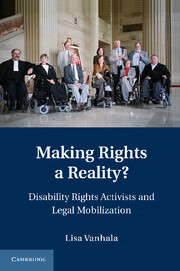Book contents
- Frontmatter
- Contents
- List of Figure and Tables
- Acknowledgments
- Abbreviations
- 1 Introduction: Legal Mobilization and Accommodating Social Movements
- 2 Rights and Political Identity in the Canadian Disability Movement
- 3 Disability Equality and Opportunity in the Supreme Court of Canada
- 4 Disability Organizations and the Diffusion of Rights in the United Kingdom
- 5 Framing Disability Equality in the UK Courts
- 6 Conclusions: Litigation, Mobilization, and Social Movements
- Bibliography
- Index
5 - Framing Disability Equality in the UK Courts
Published online by Cambridge University Press: 03 May 2011
- Frontmatter
- Contents
- List of Figure and Tables
- Acknowledgments
- Abbreviations
- 1 Introduction: Legal Mobilization and Accommodating Social Movements
- 2 Rights and Political Identity in the Canadian Disability Movement
- 3 Disability Equality and Opportunity in the Supreme Court of Canada
- 4 Disability Organizations and the Diffusion of Rights in the United Kingdom
- 5 Framing Disability Equality in the UK Courts
- 6 Conclusions: Litigation, Mobilization, and Social Movements
- Bibliography
- Index
Summary
INTRODUCTION
In a country that has been traditionally averse to the concept of enumerated rights, there has been a remarkable shift over the last fifteen years toward a rights-based framework in disability law and policy in Great Britain. Since 1995, four related acts providing legal protections against discrimination based on disability have been adopted by the UK parliament; one of these implements supranational European Union (EU) legislation. In addition, the European Convention on Human Rights (ECHR), signed by the UK in 1951, was incorporated into domestic law with the passing of the Human Rights Act (HRA) 1998, also offering protection to persons with disabilities. These pieces of legislation have, as this chapter demonstrates, served as the basis for an expanding role of the courts in defining, clarifying, and expanding on policy relevant to persons with disabilities. As in Canada, disability activists have turned to the courts to advance their own conceptions of disability equality and human rights. In contrast to the Canadian case where many organizations have become involved in strategic litigation efforts, in the UK it was one institution – the publicly funded Disability Rights Commission (DRC) – that (until it closed its doors in 2007) was the key organizational driver of legal mobilization on disability issues. This chapter argues that, due largely to the prompting by the DRC through its proactive litigation strategy, the UK courts have played a seminal role in the way the rights of persons with disabilities are interpreted and implemented.
- Type
- Chapter
- Information
- Making Rights a Reality?Disability Rights Activists and Legal Mobilization, pp. 203 - 246Publisher: Cambridge University PressPrint publication year: 2010



